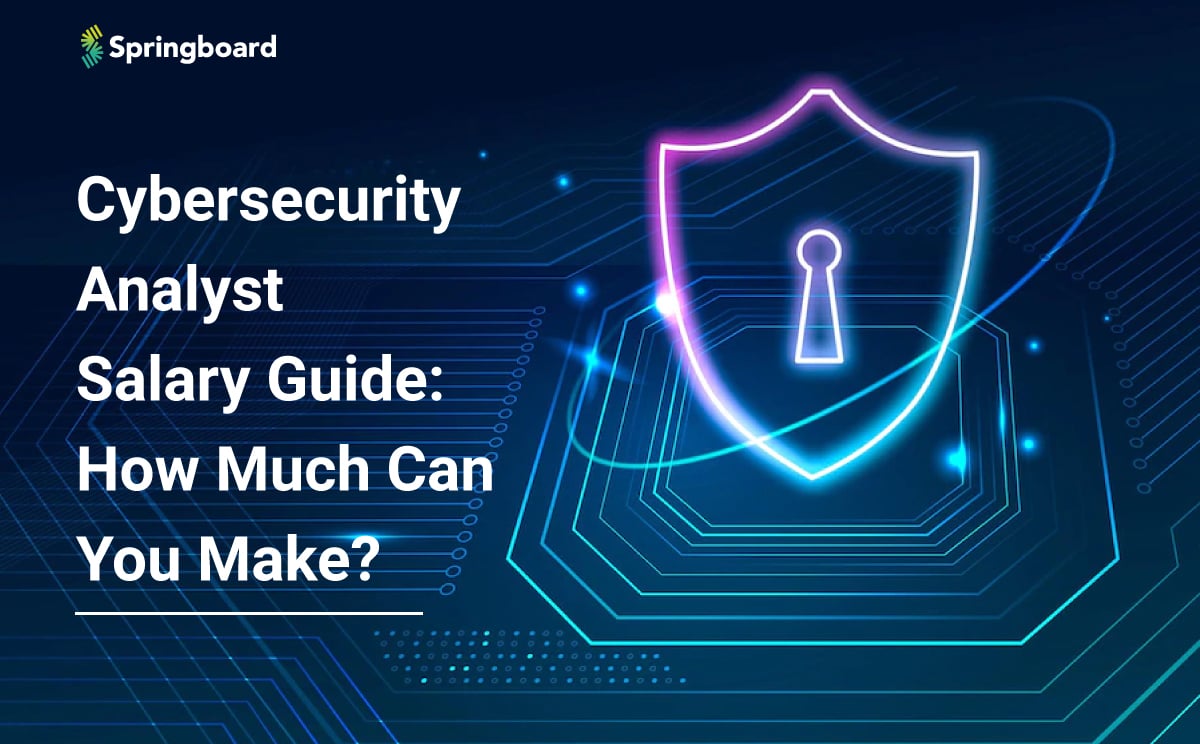Free Cybersecurity Course
Enter the cybersecurity field with our free introductory course. Learn the basics and build a strong foundation.
As more and more companies are beginning to understand the importance of cybersecurity, the demand for cybersecurity analysts (also known as information security analysts) has risen accordingly. Labor statistics show that working as a cybersecurity analyst can be a lucrative career, with higher than average salaries and a positive job outlook for the future. According to Talent.com’s salary data, salary ranges vary from $88,000 per year to $144,000 per year for information security analysts seeking a entry-level position to senior professionals at the top of their cyber security career.
There are, however, a range of factors that will determine how much you can actually demand in the job market as a cyber security analyst, including professional certifications, location, and the amount of on-the-job experience gained. In this article, we take a look at the various factors at play when it comes to your salary as a cybersecurity analyst and the ways in which you can increase your earning potential.


Become a Cybersecurity Analyst. Land a Job or Your Money Back.
Conduct vulnerability assessments into on-premise and cloud security risks. Work 1:1 with an industry mentor. Graduate with a CompTIA Security+ Certification. Land a job — or your money back.
What Does a Cyber Security Analyst Do?
As a cyber security analyst, you’ll protect computer systems and computer networks from cyberattacks and unauthorized access. They do this by:
- Monitoring computer networks, traffic and computer systems for security breaches, incidents and events.
- Investigating incidents and responding to events in real time as hackers try to infiltrate computer systems
- Analyzing information technology security data to identify trends and patterns.
- Developing and implementing security measures, policies and procedures; assess risks and devise innovative solutions.
- Educating employees on cybersecurity best practices, implementing data encryption programs.
- Testing and evaluating security systems and controls.
- Keeping up with the latest cyber security threats and trends.
Information security analysts play a vital role in protecting organizations from cyberattacks, which can cause significant financial damage, reputational harm, and disruption to operations.
How Much Does a Cybersecurity Analyst Make on Average?
The salary of a cyber security analyst in the US is $82,609, according to Glassdoor and higher, according to other labor statistics. But as we’re going to see, the salary for cyber security jobs can vary significantly based on your industry, company, level of education, and experience.

Cyber Security Analyst Salary – By Experience
Perhaps the biggest determinant of the salary of security analysts is the number of years they’ve accrued in the job market. Let’s now take a look at the annual salary of cybersecurity analysts based on their experience.
Internship
According to Glassdoor, the national median salary for cybersecurity interns in the United States is $54,982. The pay for interns in the field ranges from $34,000 to $90,000, but you’re most likely to make in the range of $43,000 to $71,000. Not every cyber security analyst will go through an internship, but it can be a great way to build your problem-solving skills and improve your job outlook. It may mean working outside of normal business hours, however.

Entry-Level
This is a cybersecurity position for analysts who are just entering the cybersecurity industry. The average salary for entry-level cyber security analysts is $73,454, according to Glassdoor. Information security analysts in the 75th percentile make around $80,000 a year, and are in high demand according to the Occupational Outlook Handbook. It’s one of the most lucrative fields in information technology.

Mid-Level
A mid-level cybersecurity analyst is one who has between five and nine years of experience in the cybersecurity industry. The median salary of mid-level cyber security analysts is $89,413, according to Glassdoor.

Senior Level
According to Glassdoor, senior career security specialists earn $113,244 a year on average in the United States. These are security analysts who have over ten years of experience in the industry.
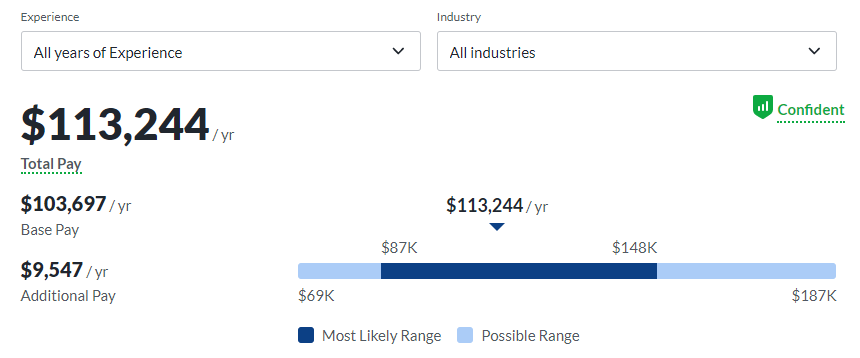
Cyber Security Analyst Salary – By Industry
Cybersecurity salaries tend to vary based on industry. Here’s a look at how analysts are paid in some of the most popular industries.
Tech
Tech companies tend to offer the highest wages for cybersecurity analysts. At Google, for example, the average pay for information security analysts is $160,461, which is significantly higher than the industry average.
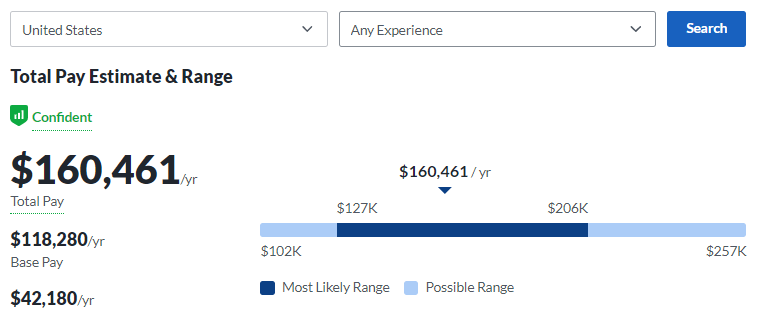
Healthcare
Information security analysts can play a key role in helping maintain secure healthcare records and protect medical data from cyber threats. HCA Healthcare, a large healthcare facilities operator in the USA, currently offers $69,100 for the information security analyst role. That’s on the lower end of the salary you would make as a cybersecurity analyst in the healthcare space. A senior cybersecurity analyst at GE Healthcare makes as much as $131,363 on average.
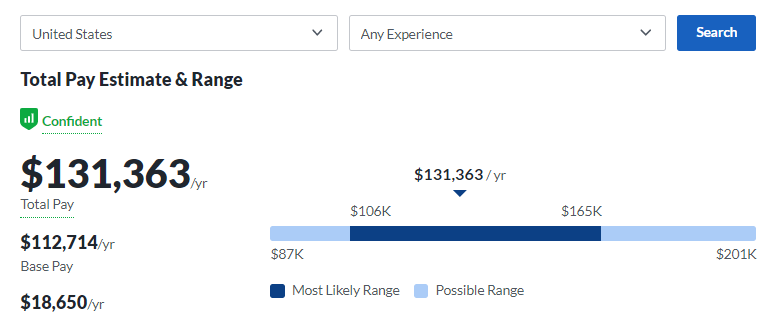
Government
From the local to the federal level, government cybersecurity analysts are in high demand. Cybersecurity professionals in these roles are expected to have hands-on experience in threat intelligence, large-scale security systems, and creating regulatory frameworks for cyber systems. The United States Federal Government pays cybersecurity analysts $98,469 per year on average. The average base salary for an information technology auditor role is $87,335, but other information security analysts earn even more.

Finance
Salaries in the finance industry come close to rivaling those in tech. The median salary for security analysts at Goldman Sachs is $111,232. Salaries for security roles at the company range from $102,000 to $122,000.

Cyber Security Analyst Salary – By Popular Companies
Here’s a look at how much you can make as a cybersecurity analyst at some of the larger companies that hire for this role.
Booz Allen Hamilton
According to Glassdoor, the salary for a cyber analyst that has built their analytical skills at Booz Allen Hamilton, the information tech consulting firm, is $88,330.
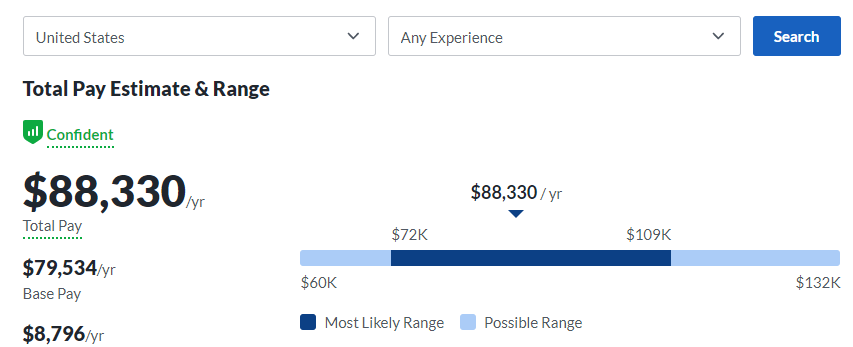
Deloitte
Cybersecurity analysts at Deloitte, the management consulting company, make $73,193 on average, according to Indeed.

Cisco
The average annual salary for an information security analyst at Cisco, the digital communications company, is $107,031, according to Indeed.

Microsoft
Security analysts at Microsoft, the tech behemoth, make $142,414 on average per year. However, it’s important to note that the average base pay is $113,000 and the remaining is additional pay.

Cybersecurity Analyst Salary – By Location
Your salary as a cybersecurity analyst will vary significantly depending on where you’re located. Let’s see where the salaries fall for a few different countries.
USA
Here’s a graph that depicts how salaries for information security analysts varies from state to state in the USA. The lighter-colored regions are the ones that are closer to the lower end of the salary range for security analysts. Montana, for example, has an average salary of $60,920. The darker regions are those where the salary is on the higher end. New York pays its security analysts $113,650 per year on average, which makes it one of the highest-paying states for the role.
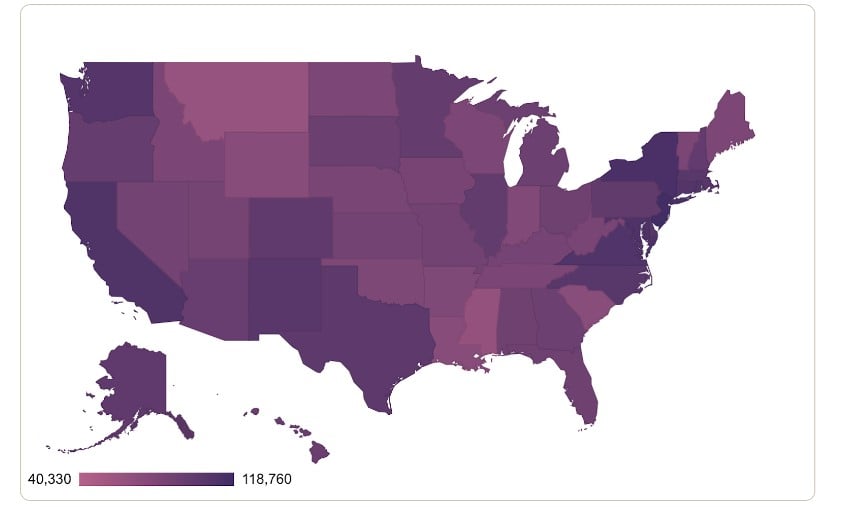
UK
The average base salary for cyber security analysts in the London area is £46,465, which amounts to about $54,000. Here’s a snapshot of the salaries being offered by companies hiring cybersecurity analysts in the United Kingdom.

China
Cybersecurity analysts in the Shanghai region make an average of 412,826 CNY per year. That comes out to about $56,500.
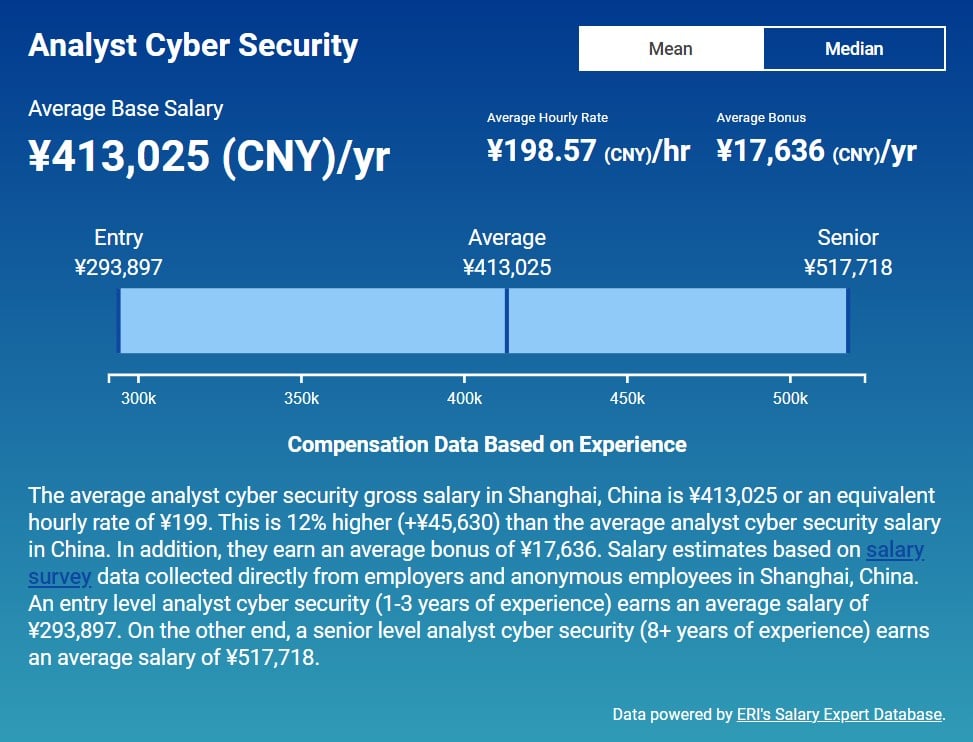
Spain
Cybersecurity analysts in Madrid make €30,115, or $30,000 USD on average per year. That number increases marginally to €32,853, or $32,500, in Barcelona.

India
Cybersecurity analysts in India make an annual salary of 500,000 INR ($6,000) per year.
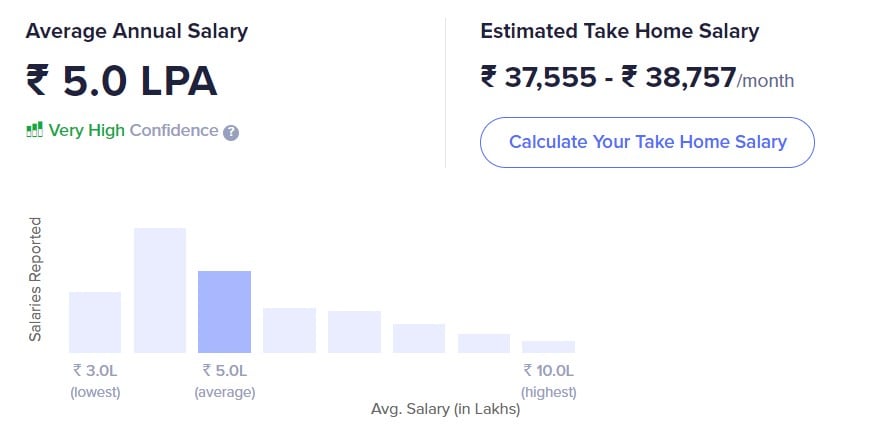
Brazil
The average salary of cybersecurity analysts in Brazil is BRL 195,195, about $38,000.

South Africa
Cybersecurity analysts in South Africa make 240,826 ZAR per year on average, about $13,000

Cybersecurity Salary – By Education
Cybersecurity is a field that you can enter even if you don’t have a degree. However, your educational background can have an effect on how much you make, especially in the early stages of your career. Let’s take a look at how much cybersecurity analysts’ salaries vary based on their education.
No Degree
As the graph below indicates, cybersecurity analysts who don’t possess a degree make between $61,000 and $65,000 on average annually. However, holding a certification (e.g. Certified Information Systems Security Professional) can boost that salary.

Bachelor’s Degree
If you have a bachelor’s degree under your belt, then you will likely make between $65,500 and $67,500 as a cybersecurity analyst.
Master’s Degree
There seems to be only a marginal bump in salary from earning a master’s degree. Cybersecurity analysts who have one make between $65,500 and $68,500 on average.
How To Boost Your Cybersecurity Salary

Here are a few things you can do to maximize your earning potential in a cybersecurity analyst role.
Expand Your Skill set
You will increase your value as a cybersecurity analyst the more you broaden your skill set. You can do so in a few different ways. Cybersecurity bootcamps are a great way to quickly pick up new skills in the field. You can also work on your own cybersecurity projects, which has the added benefit of contributing to your portfolio.
Choose the Right Industry and Location
As you’ve already seen, salaries in this field vary greatly depending on the industry that you work in and where you’re located. If you do have the freedom to do so, consider relocating to an area where salaries are higher with a high volume of companies in high-paying industries.
Gain More Experience
This is one that applies to just about any job. You can’t rush gaining experience, but sticking around in the game longer will mean that companies trust you more and will be more likely to entrust you with higher-paying cybersecurity positions.
Related Read: How To Get Into Cybersecurity With No Experience
Pursue a Relevant Certification
You can pick up a cyber security certification if you want to learn how to use specific security tools or gain key technical skills. There are all kinds of certifications available, so make sure that you pick one that suits your interests.
Ask for a Salary Review
Negotiating a higher salary doesn’t need to be an awkward process. Companies are often willing to review an employee’s salary as long as their performance has been up to standards. So make sure that you have that conversation with your manager or HR department if you believe you’re due a salary bump.
Get To Know Other Cybersecurity Students
Gabrielle Oler
Systems Administrator at Coherent Technical Services
Jose Mendoza
Cyber Security Career Track Student at Springboard
Vianey Luna
IT Security Specialist at Cooper Machinery Services
Cybersecurity Analyst Salary FAQs
We’ve got the answers to your most frequently asked questions.
Is Cybersecurity a Good Career Choice?
Yes. The demand for cybersecurity analysts is at meteoric levels, and as we’ve already seen, salaries in the field are very competitive.
Is a Cybersecurity Analyst Role Stressful?
It depends on how you respond to stress and what kinds of things stress you out. Remember that enhancing your technical skills can help boost your productivity. And you can have a conversation with your manager if you ever feel like your workload is beginning to stress you out.
Do You Need a Degree To Be a Cybersecurity Analyst?
No. While having a degree can help, many companies now hire candidates if they’ve graduated from a cybersecurity bootcamp, or have a portfolio of projects that they can show to evince their skills.
Does a Cybersecurity Analyst Need To Know How To Code?
Not all cybersecurity analysts code. Those who do code usually program in languages like Java, Javascript, Python, C, and PHP.
How Can I Earn the Highest Salary Possible in My Cybersecurity Career?
You’ll be glad to learn that cybersecurity is one of the highest-paying jobs in the tech industry, with higher than average salaries, both per hour and per year. But if you want to earn more, there are a few things you can do:
Get a certification: Certifications can boost your earning potential. Certified professionals are top earners. You can get certified in your area of speciality, eg. working in information systems, or using specific software solutions.
Follow a clear career path: Entry-level positions will always pay less than more senior roles. If your employer isn’t enabling you to climb the corporate ladder as you gain experience, it’s time to start looking at other organizations in a related field, or to consider remote work in another country.
Know the national average: Salary negotiations are so much smoother if you know what the national average salary range is. Employers may be more open to negotiation if you can get numbers from the Bureau of Labor Statistics to back you up.
Get educated: A bachelor’s degree coupled with professional experience will help you increase your earning potential. You have to keep learning, even if you have a degree. Education and self-study has become increasingly important because the field of cybersecurity is constantly changing – as are the potential threats you’ll face and the security enhancements you need to protect yourself. Bootcamps and courses prepare students to deal with the latest threats and attacks.
Get specialized: Employers may be willing to pay more per hour or month if you are specialized. Information security analysts and risk managers may earn more than generalists, for example. You can also use this specialization to work as a consultant – one of the highest paying roles out there!
Whether you work in cybersecurity or in one of the related fields in the industry, you can earn what you’re worth if you are willing to work for it!
Since you’re here…
There are hundreds of thousands of vacant cybersecurity jobs, and one of them has your name on it. You can enter the industry in 6 months flat with our Cybersecurity Course. We’ve helped over 10,000 students make huge career changes with our fully flexible mentor-led bootcamps. Explore our free cybersecurity course curriculum today to start your career switch story.
